【金榜课件——知识建构篇】(教师用书)2014高考英语二轮(考情前瞻+典题自测+热点考向+易错点拨)第一部分 词法 第5讲 动词的时态和语态(全部以2013高考真题、模拟题为例,80张ppt)
文档属性
| 名称 | 【金榜课件——知识建构篇】(教师用书)2014高考英语二轮(考情前瞻+典题自测+热点考向+易错点拨)第一部分 词法 第5讲 动词的时态和语态(全部以2013高考真题、模拟题为例,80张ppt) | 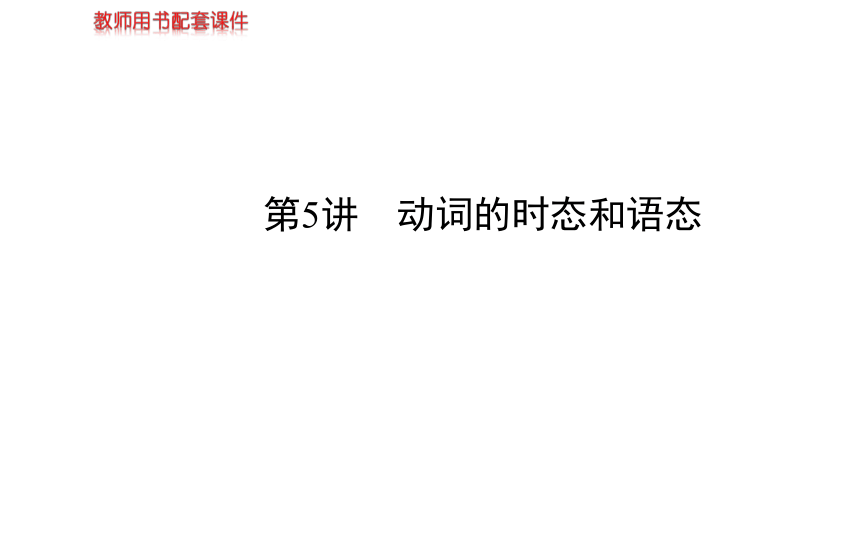 | |
| 格式 | zip | ||
| 文件大小 | 3.4MB | ||
| 资源类型 | 教案 | ||
| 版本资源 | |||
| 科目 | 英语 | ||
| 更新时间 | 2014-03-12 20:41:15 | ||
图片预览

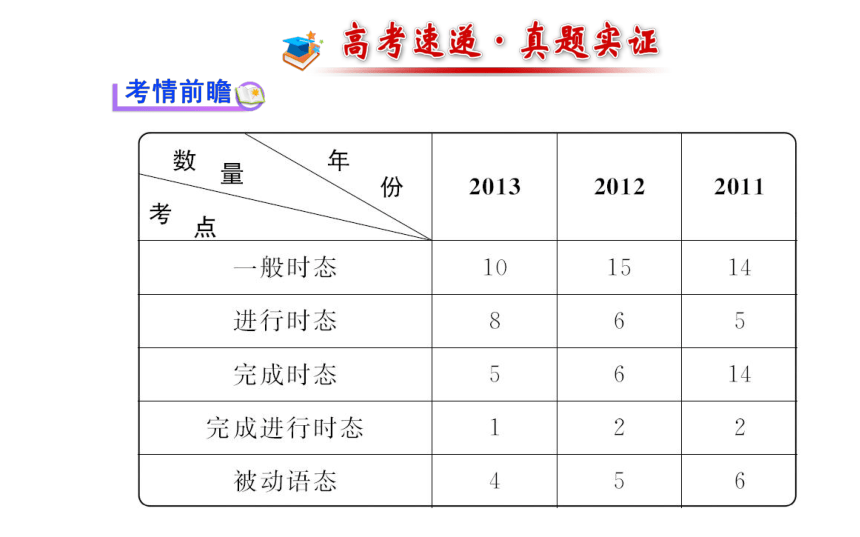
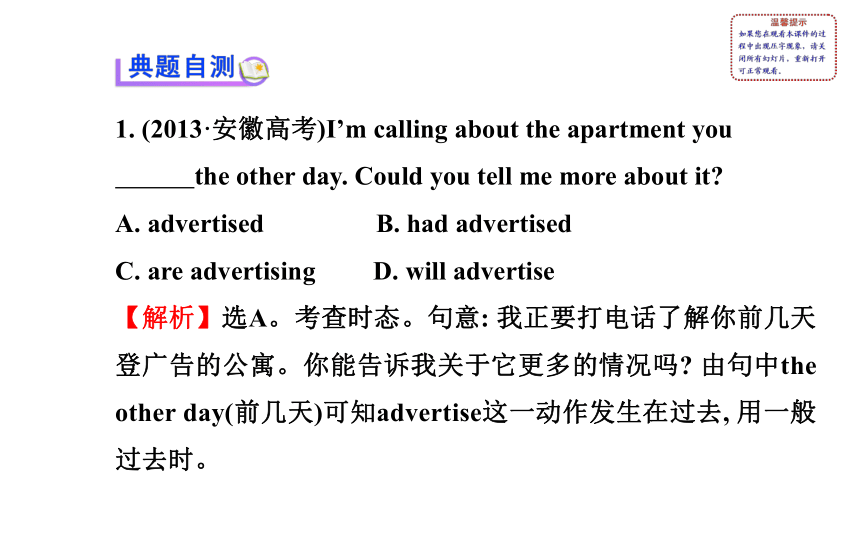
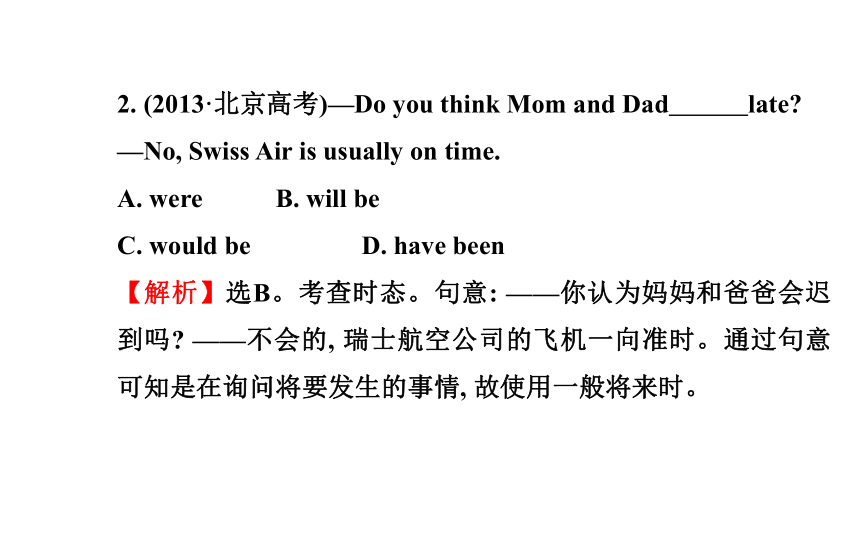
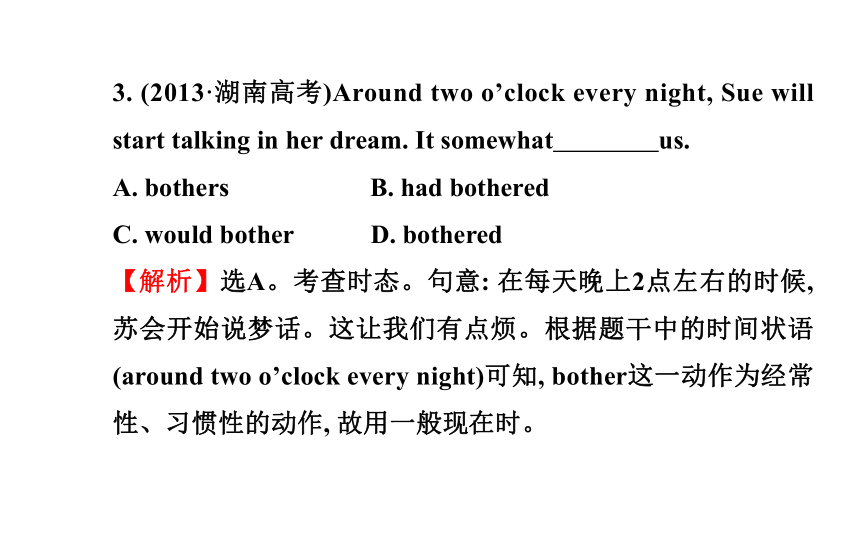

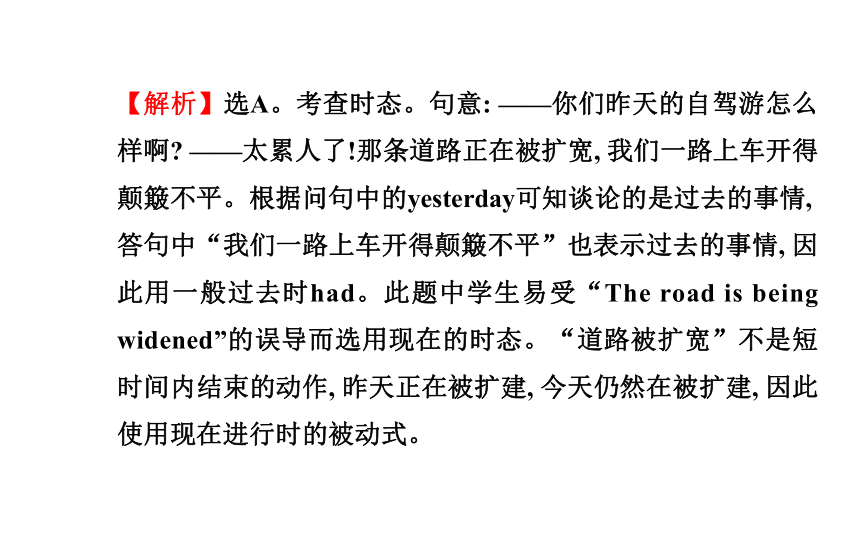
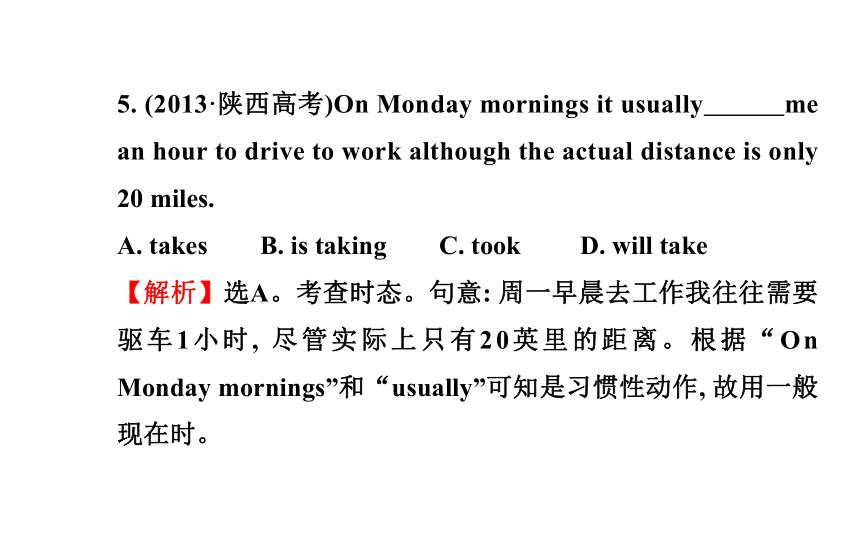
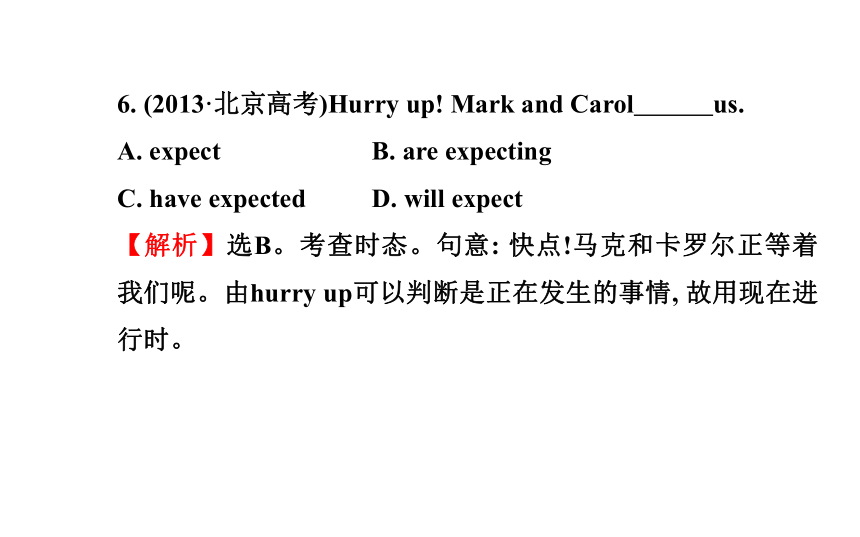
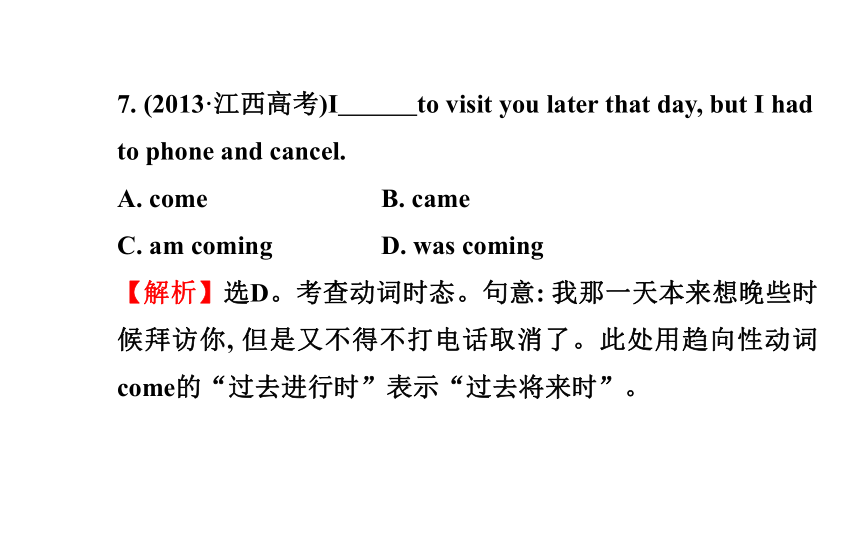

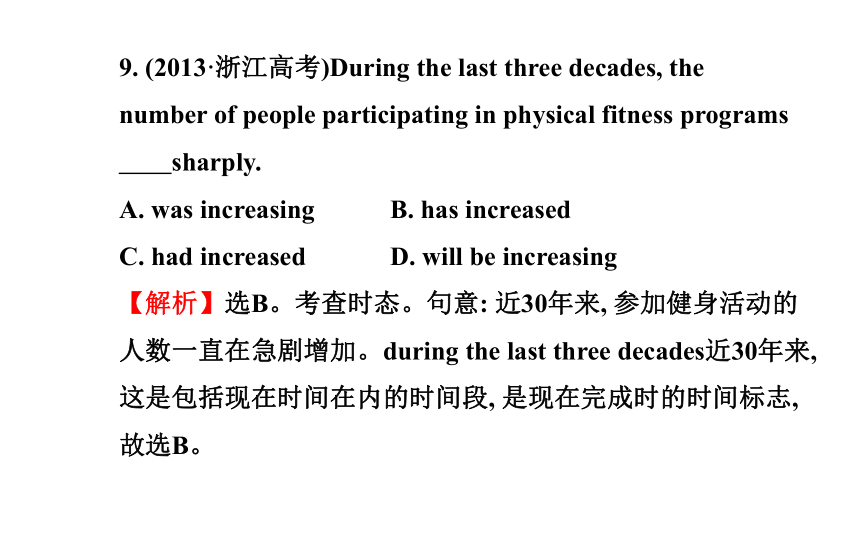
文档简介
课件80张PPT。第5讲 动词的时态和语态1. (2013·安徽高考)I’m calling about the apartment you
the other day. Could you tell me more about it?
A. advertised B. had advertised
C. are advertising D. will advertise
【解析】选A。考查时态。句意: 我正要打电话了解你前几天登广告的公寓。你能告诉我关于它更多的情况吗? 由句中the other day(前几天)可知advertise这一动作发生在过去, 用一般过去时。2. (2013·北京高考)—Do you think Mom and Dad late?
—No, Swiss Air is usually on time.
A. were B. will be
C. would be D. have been
【解析】选B。考查时态。句意: ——你认为妈妈和爸爸会迟到吗? ——不会的, 瑞士航空公司的飞机一向准时。通过句意可知是在询问将要发生的事情, 故使用一般将来时。3. (2013·湖南高考)Around two o’clock every night, Sue will start talking in her dream. It somewhat us.
A. bothers B. had bothered
C. would bother D. bothered
【解析】选A。考查时态。句意: 在每天晚上2点左右的时候, 苏会开始说梦话。这让我们有点烦。根据题干中的时间状语(around two o’clock every night)可知, bother这一动作为经常性、习惯性的动作, 故用一般现在时。4. (2013·江苏高考)—What about your self-drive trip yesterday?
—Tiring! The road is being widened, and we a rough ride.
A. had B. have
C. would have D. have had【解析】选A。考查时态。句意: ——你们昨天的自驾游怎么样啊? ——太累人了!那条道路正在被扩宽, 我们一路上车开得颠簸不平。根据问句中的yesterday可知谈论的是过去的事情, 答句中“我们一路上车开得颠簸不平”也表示过去的事情, 因此用一般过去时had。此题中学生易受“The road is being widened”的误导而选用现在的时态。“道路被扩宽”不是短时间内结束的动作, 昨天正在被扩建, 今天仍然在被扩建, 因此使用现在进行时的被动式。5. (2013·陕西高考)On Monday mornings it usually me an hour to drive to work although the actual distance is only 20 miles.
A. takes B. is taking C. took D. will take
【解析】选A。考查时态。句意: 周一早晨去工作我往往需要驱车1小时, 尽管实际上只有20英里的距离。根据“On Monday mornings”和“usually”可知是习惯性动作, 故用一般现在时。6. (2013·北京高考)Hurry up! Mark and Carol us.
A. expect B. are expecting
C. have expected D. will expect
【解析】选B。考查时态。句意: 快点!马克和卡罗尔正等着我们呢。由hurry up可以判断是正在发生的事情, 故用现在进行时。7. (2013·江西高考)I to visit you later that day, but I had to phone and cancel.
A. come B. came
C. am coming D. was coming
【解析】选D。考查动词时态。句意: 我那一天本来想晚些时候拜访你, 但是又不得不打电话取消了。此处用趋向性动词come的“过去进行时”表示“过去将来时”。8. (2013·新课标全国卷Ⅱ)We very early so we packed the night before.
A. leave B. had left
C. were leaving D. have left
【解析】选C。考查时态。句意: 因为我们要早早地离开, 所以我们在前一天晚上就整理行装。根据句意可知, 此处描述的是过去的事情。leave这一动作发生在packed这一动作之后, 所以用过去将来时。过去进行时可以表示过去某个时间按计划将做某事, 故选C。9. (2013·浙江高考)During the last three decades, the
number of people participating in physical fitness programs
sharply.
A. was increasing B. has increased
C. had increased D. will be increasing
【解析】选B。考查时态。句意: 近30年来, 参加健身活动的人数一直在急剧增加。during the last three decades近30年来, 这是包括现在时间在内的时间段, 是现在完成时的时间标志, 故选B。10. (2013·辽宁高考)He was unhappy when he sold his guitar. After all, he it for a very long time.
A. has had B. had had
C. has D. had
【解析】选B。考查时态。句意: 当他卖掉他的吉他的时候他不高兴, 毕竟, 他拥有它已经很长一段时间了。卖掉吉他和不高兴这两个动作都用了一般过去时, 而拥有吉他一定是在这之前的动作, 所以要用过去完成时。11. (2013·福建高考)The girl has a great interest in sport and
badminton classes twice a week over the last three
years.
A. took B. is taking
C. takes D. has been taking
【解析】选D。考查时态。句意: 这个女孩对运动有极大的兴趣, 在过去的三年她一直每周上两次羽毛球课。上羽毛球课这一动作从过去开始一直反复持续到现在, 并且还有可能继续下去, 故用现在完成进行时。12. (2013·北京高考)Shakespeare’s play Hamlet into at least ten different films over the past years.
A. had been made B. was made
C. has been made D. would be made
【解析】选C。考查时态和语态。句意: 莎士比亚的戏剧《哈姆雷特》在过去几年里被制作成了至少十部不同的电影。时间状语over the past years与现在完成时连用, 且主语与make之间是被动关系, 故用现在完成时的被动形式。13. (2013·北京高考)—So what is the procedure?
—All the applicants before a final decision is made by the authority.
A. interview B. are interviewing
C. are interviewed D. are being interviewed
【解析】选C。考查时态和语态。句意: ——那么程序是什么呢? ——所有的申请人在官方做出最终决定之前都要被面试。由上下语境可知说话人在陈述一项规定, 故用一般现在时, 且主语与interview之间是被动关系, 选C。14. (2013·湖南高考)If nothing , the oceans will turn into fish deserts.
A. does B. had been done
C. will do D. is done
【解析】选D。考查时态。句意: 要是什么都不做, 海洋将变成鱼的沙漠。if引导条件状语从句, 从句中用一般现在时代替将来时态, 故选D。15. (2013·辽宁高考)We are confident that the environment
by our further efforts to reduce pollution.
A. had been improved B. will be improved
C. is improved D. was improved
【解析】选B。考查时态和语态。句意: 通过在减少污染方面的进一步努力, 我们相信环境将会有所改善。根据句意此处应用一般将来时且为被动语态, 故选B。热点考向 1 一般时态?
1. 主要考点:
(1)高考对于一般时态的考查主要从现在、过去和将来的角度, 从语境和表示时间的状语来考查对时态发生的时间的判断, 有时候也通过从句来限定; (2)注意一般过去时与现在完成时的区分。
①两者都表示发生在过去的动作。但现在完成时表示过去动作与现在的关系, 主要说明现在的情况; 一般过去时强调动作发生在过去某一时间, 不强调与现在的联系。例如:
They’ve gone to Paris.
他们到巴黎去了(说明他们现在去巴黎了, 不在这里)。
They went to Paris.
他们去过巴黎(只说明去过, 不表明是否现在仍在那里)。②现在完成时表示从过去发生到现在一段时间内的任何时间, 可与today, this week, since等表示包括现在一段时间的状语连用, 但不能和表示过去时间的状语连用; 一般过去时表示的是过去某一特定时间或与现在无关的某一过去时间。
I haven’t seen the film yet.
我还没看过这部影片(到目前为止)。
I saw the film the day before yesterday.
我前天看的这部电影(表明看电影的时间是在前天)。2. 突破技巧:
(1)首先看句子有没有表示时间的状语, 依据时间状语推断时态;
(2)明确句子语境意义, 通过语境透露的信息, 把握动作发生的时间, 以此推断时态;
(3)把握复合句中时态、上下文句子时态的呼应。【真题变式】用动词的适当形式完成句子。
(2012·重庆高考)—Kevin, you look worried. Anything wrong?
—Well, I ____(take)a test and I’m waiting for the result. took热点考向 2 进行时态?
1. 考查内容: 主要包括现在、过去和将来。
(1)一般现在时与现在进行时的区分
①一般现在时主要用于习惯性或经常性的动作, 常伴随使用频度副词usually, often, seldom等; 现在进行时主要用于表示目前或现阶段正在进行的动作或状态, 常跟时间状语now, at present等连用。
He usually writes a lot of letters, but he isn’t writing at present. 他经常写许多信, 但他现在没在写。②表示客观事实或普遍真理时, 要用一般现在时, 不能用现在进行时。
The Earth goes around the Sun. 地球绕着太阳转。
(2)一般过去时与过去进行时的区分
①一般过去时表示一个完成的动作, 而过去进行时表示过去某一阶段正在进行的动作。
I was reading a novel last night.
昨晚我在看小说(可能没看完)。
I read a novel last night.
我昨晚看了一本小说(已经看完了)。②一般过去时用于表示一个单纯动作, 过去进行时用于表示过去一段时间反复做的动作。
Did he ask questions? 他提问题了吗?
He was asking questions the whole time.
他始终在提问题。③一般过去时表示过去某个时刻发生的动作(侧重说明事实), 过去进行时表示过去某一时刻或某一段时间发生的动作(强调在这一过程中所进行的动作或展开的情景)。
He drew a picture yesterday afternoon.
他昨天下午画了一张画(昨天下午他做了这么一件事)。
He was drawing a picture yesterday afternoon.
他昨天下午在画一张画(昨天下午他一直在画画, 没干别的事)。④过去进行时表示过去某个时间正在进行的动作, 一般过去时表示当时临时发生的短暂性动作。
When I was pouring the tea, I dropped a cup.
我在倒茶的时候, 失手打了一个茶杯。 (3)一般将来时与将来进行时的区分
一般将来时表示对“现在时刻”来说, 将要发生的动作或将要存在的状态; 而将来进行时表示将来的某一时刻或某段时间正在进行的动作。
She is sixteen, who will be seventeen next year.
她十六岁, 明年将十七岁。
What will you be doing at this time next Monday?
下周一的这时候你将会在做什么呢? 2. 突破技巧:
(1)根据语境把握动作正在进行和发生;
(2)从某个时间点推知正在发生的动作。【真题变式】翻译下面句子。
(2012·福建高考)—When did the computer crash?
—This morning, while I was sorting the reading materials
downloaded from some websites.
_____________________________________________________
____________________________——电脑什么时候死机的? ——今天早上, 在我整理从某些网站下载的阅读材料时(发生的)。热点考向 3 完成时态
1. 主要考点: 一般从现在、过去两种情况的完成时进行命题。
过去完成时与一般过去时的区别:
(1)过去完成时表示在过去某一时间或动作以前已经发生或完成的动作, 在句中一般有另一过去时间或动作与它相比较, 它是一个相对的时态, 表示的是过去的过去, 只有在和过去某时或某动作相比较时才用到它; 一般过去时表示在过去某个时间发生的动作。She had learned some English before she came to our school.
她来我们学校以前学过一些英语(come to our school是过去发生的一个动作, learn English是come to our school以前的情况)。
We had had breakfast when she came.
她来时, 我们已经吃过早饭了(come是过去发生的一个动作, have breakfast是发生在come之前的事情)。 (2)如果主句所表示的动作发生在时间状语从句所表示的动作之前, 在状语从句中用一般过去时, 在主句中就要用过去完成时。反之, 如果时间状语从句所表示的动作发生在主句所表示的动作之前, 则在从句中用过去完成时, 主句就用一般过去时。
When I had written the letter, I went at once to post it.
我写好了信, 马上就寄了出去。2. 突破技巧:
(1)句子与典型的表示一段时间的状语连用;
(2)通过前后句子表示的语境、造成的影响或动作的持续、动作发生的先后来判断;
(3)把握特定句式中的完成时态。【真题变式】用动词的适当形式完成句子。
(2012·湖南高考)—I remember you were a talented pianist at college. Can you play the piano for me?
—Sorry, I _____________(play)the piano for years. haven’t played热点考向 4 完成进行时态?
1. 命题方式:
(1)以对现在完成进行时的考查居多;
(2)现在完成时与现在完成进行时的区分;
①现在完成时表示过去开始的一个动作到目前为止已经完成; 现在完成进行时表示动作仍继续。
I’ve read Tiny Times.
我已经看过《小时代》了(已经完成)。
I have been reading Tiny Times these days.
这些天我一直在看《小时代》(仍在继续)。②现在完成时强调过去动作的现在结果; 现在完成进行时如表示刚结束的动作时则强调动作的持续性。
I have written him a letter.
我给他写了一封信(到现在为止已经写完了)。
I have been writing a letter since three o’clock.
我从三点以来一直在写信(强调一直在写, 不表明是否写完)。③现在完成进行时一般不适用于状态动词, 要表示状态动词的“仍在继续”用法, 只能用现在完成时。
I have known him since children.
我从小就认识他(不能用现在完成进行时)。
2. 突破技巧:
体会不同语境下表示的时态含义, 根据具体语境判断。【真题变式】用动词的适当形式填空。
(2012·全国卷Ⅱ)The manager ______________(tell)the
workers how to improve the program since 9 a. m. . has been telling热点考向 5 被动语态
1. 命题角度:
(1)主语不能发出动作, 两者关系为逻辑上的动宾关系;
(2)特殊的系表结构或用主动表示被动的动词。2. 突破技巧:
(1)分析主谓, 弄清主语与谓语的关系, 判断主语能不能发出谓语的动作;
(2)掌握特殊动词用法: ①不能用被动语态的系动词类(look, seem, feel, taste, sound, smell, prove, appear等); ②表示主语特征的词(read, wash, write, sell, wear, lock等);
(3)get的一些常见构成短语(get paid/lost/hurt等)。 (4)主动形式表示被动意义
①在need, want, require, deserve, bear等动词、worth等形容词的后面, 动名词主动形式表示被动意义, 其含义相当于动词不定式的被动形式。
The house needs repairing/to be repaired.
这所房子需要修理。②在某些“主语(人/物)+be+形容词+不定式”中不定式的主动形式表达被动意义。这些形容词有nice, easy, fit, hard, difficult, important, impossible, pleasant, interesting等。
The problem is difficult to work out. 这道题很难计算出。(可看作to work out后省略了for me)
③be to rent/blame/let也属于主动形式表被动意义。
Who is to blame for the mistake?
谁应为这个错误接受谴责?
The houses are to let. 这些房子有待出租。 (5)主动语态与被动语态的区别:
主动语态表被动强调的是主语的特征, 而被动语态则强调外界作用造成的影响。【真题变式】(2012·辽宁高考)Mum, I was wondering if you
could lend me a few dollars until I _______(发工资)on Friday. get paid【命题小试】
请根据以下对话内容命制一道动词时态的题目。 —Someone has tidied the sitting room! —Jim did it this morning; he couldn’t bear the mess any more. 【参考答案】—Someone has tidied the sitting room! —Jim it this morning; he couldn’t bear the mess any more. A. has done B. did C. had done D. would do【解析】选B。this morning是过去时间状语, 结合上句has tidied可知发生了, 故选B。易错点 1 混淆相近时态区别
(母题)—Chris, what’s wrong with you? That’s the sixth cup of coffee you today.
—Nothing serious, mum, I just feel tired and sleepy.
A. have B. had
C. are having D. have had?【解析】选D。句意: ——Chris, 你怎么了? 今天你已经喝了6杯咖啡了。——妈妈, 没有什么严重事情, 我只是感觉疲劳困乏。根据语境“喝”的动作已经发生并对现在造成影响, 故用现在完成时。 (变式)—Chris, what’s wrong with you? That was the sixth cup of coffee you just now.
—Nothing serious, mum, I just feel tired and sleepy.
A. have B. had
C. are having D. have had
【解析】选B。句意: ——Chris, 你怎么了? 刚才你已喝了6杯咖啡了。——妈妈, 没有什么严重事情, 我只是感觉疲劳困乏。just now为表示过去发生动作的时间状语, 故此处时态用一般过去时。【误区点拨】
一般过去时仅表示过去发生的并已经完成的动作, 不与现在有任何联系; 而现在完成时虽然动作发生在过去但对现在造成了影响或动作仍然在持续, 均与现在有联系。易错点 2 忽视语境或逻辑关系中体现的时态
(母题)The famous reporter, who is said to have gone back to America last year, in China for almost twenty years.
A. lived B. was living
C. has lived D. have been living?【解析】选A。句意: 这位著名记者, 据说去年就回到了美国, 在中国生活了将近20年。此处由语境“who is said to have gone back to America last year”可知记者去年回国, 现在不在中国居住, 此处提到的在中国居住的情况是以前的事情, 是与现在的比较, 应该用一般过去时。 (变式)The famous reporter, who is said to go to America next year, in China for almost twenty years.
A. lived B. was living
C. has lived D. had lived
【解析】选C。句意: 这位著名记者, 据说明年就去美国, 在中国生活了将近20年。此处由语境“who is said to go to America next year”可知记者明年去美国, 现在在中国居住, 表示的是从过去开始持续到现在的事情, 故用现在完成时。【误区点拨】
①正确把握各类时态的用法, 仔细辨析区别;
②辨析句子中的时间状语, 结合语境把握准时间段;
③体会语境或句子意思所透露的时间信息。易错点 3 误用其他相近结构?
(母题)Sarah, hurry up. I’m afraid you won’t have time to
before the party.
A. get changed B. get change
C. get changing D. get to change
【解析】选A。句意: 萨拉, 快一点。在舞会开始前我担心你没有时间换衣服了。根据句意“换衣服”可知用A。get changed=get dressed。dress的宾语为人。 (变式)Sarah, hurry up, or you’ll be late for class. Don’t stay up, and you should your lifestyle.
A. get changed B. get change
C. get changing D. get to change
【解析】选D。句意: 萨拉, 快一点。否则你会上课迟到, 不要熬夜, 你应该逐渐改变你的生活方式。根据生活常识改变生活方式是一个渐进过程, 故用get to do sth. 。【误区点拨】
①掌握英语结构中的be done=get done形式, 两者的微小区别在于be done常用于表示状态, get done常用于表示动作;
②把握主语与谓语的关系, 根据主语能不能发出谓语的动作来判断主动和被动形式。1. (2013·安徽高考压轴题)I first met Mr Smith in America.
He at Stanford University then.
A. studied B. had studied
C. is studying D. was studying
【解析】选D。考查时态。句意: 我第一次是在美国见到史密斯先生的, 当时他正在斯坦福大学学习。根据句意可知学习这个动作发生在过去“then”, 用过去进行时, 表示过去正在做的动作。故选D。2. If the weather had been better, we could have had a picnic. But it all day.
A. rained B. rains
C. has rained D. is raining
【解析】选A。考查一般过去时。句意: 如果天气好的话, 我们就去野餐了。但是一整天都在下雨。根据前面句子用的是虚拟语气, 表示的是与过去发生的情况相反的假设, 故推知此处为真实情况, 用一般过去时, 选项A合适。3. Hurry up! Flight 406 off at 18: 40.
A. takes B. took
C. will be taken D. has taken
【解析】选A。考查一般现在时。句意: 赶快! 406飞机要在18: 40起飞。根据生活常识, 飞机起飞为客观事实用一般现在时, 故选项A合适。4. —Lucy, how are you getting on with your composition?
—I have rewritten it so many times that I wonder if I it.
A. finish B. finished
C. have finished D. will finish
【解析】选D。考查一般将来时。句意: ——露西, 你作文写得怎么样了? ——我重写了这么多次以至于我怀疑是否我会写完它。根据语境“还没有写完”可知用一般将来时。连词if引导的句子为宾语从句, 可以用will表示将来时。5. —How long have you known John?
—Since he to our class.
A. has come B. came
C. had come D. comes
【解析】选B。考查一般过去时。句意: ——你认识约翰多长时间了? ——自从他来我们班我就认识他了。since“自从……以来”, 主句用现在完成时, since引导的时间状语从句用一般过去时。6. Mr. White in Los Angeles for years, but recently he has already adapted to living in China.
A. was living B. had lived
C. has lived D. lived
【解析】选D。考查一般过去时。句意: 怀特先生在洛杉矶居住多年, 但是最近他已适应了在中国的生活。根据“现在已经住在中国”推知在洛杉矶居住为过去的情况, 故用一般过去时, 选项D合适。7. Whenever you are together, you !Why not give in to each other?
A. have already quarreled
B. are always quarreling
C. had still quarreled
D. have been quarreling【解析】选B。考查动词时态。句意: 无论你们什么时候在一起, 你们总是吵个不停!为什么不彼此妥协一下呢? be always doing意思为“总是做……”, 表示一种赞扬、喜欢、厌恶的情绪。根据语境“总是吵”推知“厌恶”, 故用be+频度副词(often, always, frequently)+doing形式表示, 选项B合适。8. (2013·西安模拟)—Ring me at six tomorrow morning, will you?
—Why that early? I then.
A. have slept B. have been sleeping
C. will sleep D. will be sleeping
【解析】选D。考查将来进行时。句意: ——明天早上六点给我打电话好吗? ——为什么那么早? 那时我还在睡觉呢。根据“明天; 那时还在……”可知“睡觉”为将来正在进行的动作, 故选项D合适。9. (2013·衢州模拟)When we first met on a train in 2000, we both felt immediately that we each other for years.
A. know B. had known
C. knew D. have known
【解析】选B。考查过去完成时。句意: 2000年第一次在火车上见面时, 我们两个都立刻感觉到彼此已经认识许多年了。根据“火车上相见”为过去, “认识许多年”发生在见面前为过去的过去, 故用过去完成时, 选项B合适。10. (2013·黄山模拟)The chief engineer hopes they
everything ready before we the project
next month.
A. will be getting; will start
B. will have got; start
C. have got; start
D. are getting; are going to start【解析】选B。考查将来完成时态。句意: 首席工程师希望在下个月我们开始这个项目前他们就把一切准备好。根据语境表示的时间可知项目还没有开始, “准备已经发生, 但需要在将来完成”, 故第一个空用将来完成时态, 选项B合适。11. (2013·嘉积模拟)—I’m sorry, but I don’t quite follow you. Did you say you wanted to return on September 20?
—Sorry. I myself clear. We want to return on October 20.
A. hadn’t made B. haven’t made
C. don’t make D. wouldn’t make【解析】选B。考查现在完成时态。句意: ——抱歉, 我不是很明白你的意思。你说你们想9月20号回来吗? ——抱歉。我没有把我的意思表达清楚, 我们想10月20号回来。根据语境这种“表达”已经发生并对现在造成影响, 故用现在完成时, 选项B合适。12. Since Jack was laid off from his job three months ago,
he a new one, but without luck.
A. looked for B. had looked for
C. is looking for D. has been looking for
【解析】选D。考查现在完成进行时。句意: 自从杰克三个月前失业以来, 他一直在找新工作, 但是缺乏运气。根据语境推知“寻找工作”的动作已经发生并且持续到现在还在进行, 故用现在完成进行时。13. (2013·天津模拟)—I wonder if you could go with me to the supermarket.
—Don’t disturb me. I my experiment report all the morning and haven’t finished yet.
A. have been writing B. was writing
C. have written D. write【解析】选A。考查现在完成进行时。句意: ——我想知道你是否愿意和我一起去超市。——不要打扰我。我一早上都在写实验报告还没有写完呢。根据语境“一直在做”推知“过去发生的一个动作一直持续到现在还在进行”, 故用现在完成进行时。14. My money . I must go to the bank to draw some of my savings out before I have none in hand.
A. has been run out of
B. has been run out
C. has run out
D. is running out
【解析】选D。考查将来时和语态。句意: 我的钱马上要花完了, 我必须在手头上没有钱之前去银行取出些积蓄来。此处run out为不及物动词短语, 用主动形式表示被动意义, 用be+doing形式表将来。15. (2013·北京模拟)In general, most tennis on hard courts or on clay.
A. plays B. is played
C. has played D. has been played
【解析】选B。考查被动语态。句意: 一般来说, 多数的网球都是在硬地或黏土地球场玩的。网球与玩为动宾关系, 语境为客观事实, 故用一般现在时的被动语态。
the other day. Could you tell me more about it?
A. advertised B. had advertised
C. are advertising D. will advertise
【解析】选A。考查时态。句意: 我正要打电话了解你前几天登广告的公寓。你能告诉我关于它更多的情况吗? 由句中the other day(前几天)可知advertise这一动作发生在过去, 用一般过去时。2. (2013·北京高考)—Do you think Mom and Dad late?
—No, Swiss Air is usually on time.
A. were B. will be
C. would be D. have been
【解析】选B。考查时态。句意: ——你认为妈妈和爸爸会迟到吗? ——不会的, 瑞士航空公司的飞机一向准时。通过句意可知是在询问将要发生的事情, 故使用一般将来时。3. (2013·湖南高考)Around two o’clock every night, Sue will start talking in her dream. It somewhat us.
A. bothers B. had bothered
C. would bother D. bothered
【解析】选A。考查时态。句意: 在每天晚上2点左右的时候, 苏会开始说梦话。这让我们有点烦。根据题干中的时间状语(around two o’clock every night)可知, bother这一动作为经常性、习惯性的动作, 故用一般现在时。4. (2013·江苏高考)—What about your self-drive trip yesterday?
—Tiring! The road is being widened, and we a rough ride.
A. had B. have
C. would have D. have had【解析】选A。考查时态。句意: ——你们昨天的自驾游怎么样啊? ——太累人了!那条道路正在被扩宽, 我们一路上车开得颠簸不平。根据问句中的yesterday可知谈论的是过去的事情, 答句中“我们一路上车开得颠簸不平”也表示过去的事情, 因此用一般过去时had。此题中学生易受“The road is being widened”的误导而选用现在的时态。“道路被扩宽”不是短时间内结束的动作, 昨天正在被扩建, 今天仍然在被扩建, 因此使用现在进行时的被动式。5. (2013·陕西高考)On Monday mornings it usually me an hour to drive to work although the actual distance is only 20 miles.
A. takes B. is taking C. took D. will take
【解析】选A。考查时态。句意: 周一早晨去工作我往往需要驱车1小时, 尽管实际上只有20英里的距离。根据“On Monday mornings”和“usually”可知是习惯性动作, 故用一般现在时。6. (2013·北京高考)Hurry up! Mark and Carol us.
A. expect B. are expecting
C. have expected D. will expect
【解析】选B。考查时态。句意: 快点!马克和卡罗尔正等着我们呢。由hurry up可以判断是正在发生的事情, 故用现在进行时。7. (2013·江西高考)I to visit you later that day, but I had to phone and cancel.
A. come B. came
C. am coming D. was coming
【解析】选D。考查动词时态。句意: 我那一天本来想晚些时候拜访你, 但是又不得不打电话取消了。此处用趋向性动词come的“过去进行时”表示“过去将来时”。8. (2013·新课标全国卷Ⅱ)We very early so we packed the night before.
A. leave B. had left
C. were leaving D. have left
【解析】选C。考查时态。句意: 因为我们要早早地离开, 所以我们在前一天晚上就整理行装。根据句意可知, 此处描述的是过去的事情。leave这一动作发生在packed这一动作之后, 所以用过去将来时。过去进行时可以表示过去某个时间按计划将做某事, 故选C。9. (2013·浙江高考)During the last three decades, the
number of people participating in physical fitness programs
sharply.
A. was increasing B. has increased
C. had increased D. will be increasing
【解析】选B。考查时态。句意: 近30年来, 参加健身活动的人数一直在急剧增加。during the last three decades近30年来, 这是包括现在时间在内的时间段, 是现在完成时的时间标志, 故选B。10. (2013·辽宁高考)He was unhappy when he sold his guitar. After all, he it for a very long time.
A. has had B. had had
C. has D. had
【解析】选B。考查时态。句意: 当他卖掉他的吉他的时候他不高兴, 毕竟, 他拥有它已经很长一段时间了。卖掉吉他和不高兴这两个动作都用了一般过去时, 而拥有吉他一定是在这之前的动作, 所以要用过去完成时。11. (2013·福建高考)The girl has a great interest in sport and
badminton classes twice a week over the last three
years.
A. took B. is taking
C. takes D. has been taking
【解析】选D。考查时态。句意: 这个女孩对运动有极大的兴趣, 在过去的三年她一直每周上两次羽毛球课。上羽毛球课这一动作从过去开始一直反复持续到现在, 并且还有可能继续下去, 故用现在完成进行时。12. (2013·北京高考)Shakespeare’s play Hamlet into at least ten different films over the past years.
A. had been made B. was made
C. has been made D. would be made
【解析】选C。考查时态和语态。句意: 莎士比亚的戏剧《哈姆雷特》在过去几年里被制作成了至少十部不同的电影。时间状语over the past years与现在完成时连用, 且主语与make之间是被动关系, 故用现在完成时的被动形式。13. (2013·北京高考)—So what is the procedure?
—All the applicants before a final decision is made by the authority.
A. interview B. are interviewing
C. are interviewed D. are being interviewed
【解析】选C。考查时态和语态。句意: ——那么程序是什么呢? ——所有的申请人在官方做出最终决定之前都要被面试。由上下语境可知说话人在陈述一项规定, 故用一般现在时, 且主语与interview之间是被动关系, 选C。14. (2013·湖南高考)If nothing , the oceans will turn into fish deserts.
A. does B. had been done
C. will do D. is done
【解析】选D。考查时态。句意: 要是什么都不做, 海洋将变成鱼的沙漠。if引导条件状语从句, 从句中用一般现在时代替将来时态, 故选D。15. (2013·辽宁高考)We are confident that the environment
by our further efforts to reduce pollution.
A. had been improved B. will be improved
C. is improved D. was improved
【解析】选B。考查时态和语态。句意: 通过在减少污染方面的进一步努力, 我们相信环境将会有所改善。根据句意此处应用一般将来时且为被动语态, 故选B。热点考向 1 一般时态?
1. 主要考点:
(1)高考对于一般时态的考查主要从现在、过去和将来的角度, 从语境和表示时间的状语来考查对时态发生的时间的判断, 有时候也通过从句来限定; (2)注意一般过去时与现在完成时的区分。
①两者都表示发生在过去的动作。但现在完成时表示过去动作与现在的关系, 主要说明现在的情况; 一般过去时强调动作发生在过去某一时间, 不强调与现在的联系。例如:
They’ve gone to Paris.
他们到巴黎去了(说明他们现在去巴黎了, 不在这里)。
They went to Paris.
他们去过巴黎(只说明去过, 不表明是否现在仍在那里)。②现在完成时表示从过去发生到现在一段时间内的任何时间, 可与today, this week, since等表示包括现在一段时间的状语连用, 但不能和表示过去时间的状语连用; 一般过去时表示的是过去某一特定时间或与现在无关的某一过去时间。
I haven’t seen the film yet.
我还没看过这部影片(到目前为止)。
I saw the film the day before yesterday.
我前天看的这部电影(表明看电影的时间是在前天)。2. 突破技巧:
(1)首先看句子有没有表示时间的状语, 依据时间状语推断时态;
(2)明确句子语境意义, 通过语境透露的信息, 把握动作发生的时间, 以此推断时态;
(3)把握复合句中时态、上下文句子时态的呼应。【真题变式】用动词的适当形式完成句子。
(2012·重庆高考)—Kevin, you look worried. Anything wrong?
—Well, I ____(take)a test and I’m waiting for the result. took热点考向 2 进行时态?
1. 考查内容: 主要包括现在、过去和将来。
(1)一般现在时与现在进行时的区分
①一般现在时主要用于习惯性或经常性的动作, 常伴随使用频度副词usually, often, seldom等; 现在进行时主要用于表示目前或现阶段正在进行的动作或状态, 常跟时间状语now, at present等连用。
He usually writes a lot of letters, but he isn’t writing at present. 他经常写许多信, 但他现在没在写。②表示客观事实或普遍真理时, 要用一般现在时, 不能用现在进行时。
The Earth goes around the Sun. 地球绕着太阳转。
(2)一般过去时与过去进行时的区分
①一般过去时表示一个完成的动作, 而过去进行时表示过去某一阶段正在进行的动作。
I was reading a novel last night.
昨晚我在看小说(可能没看完)。
I read a novel last night.
我昨晚看了一本小说(已经看完了)。②一般过去时用于表示一个单纯动作, 过去进行时用于表示过去一段时间反复做的动作。
Did he ask questions? 他提问题了吗?
He was asking questions the whole time.
他始终在提问题。③一般过去时表示过去某个时刻发生的动作(侧重说明事实), 过去进行时表示过去某一时刻或某一段时间发生的动作(强调在这一过程中所进行的动作或展开的情景)。
He drew a picture yesterday afternoon.
他昨天下午画了一张画(昨天下午他做了这么一件事)。
He was drawing a picture yesterday afternoon.
他昨天下午在画一张画(昨天下午他一直在画画, 没干别的事)。④过去进行时表示过去某个时间正在进行的动作, 一般过去时表示当时临时发生的短暂性动作。
When I was pouring the tea, I dropped a cup.
我在倒茶的时候, 失手打了一个茶杯。 (3)一般将来时与将来进行时的区分
一般将来时表示对“现在时刻”来说, 将要发生的动作或将要存在的状态; 而将来进行时表示将来的某一时刻或某段时间正在进行的动作。
She is sixteen, who will be seventeen next year.
她十六岁, 明年将十七岁。
What will you be doing at this time next Monday?
下周一的这时候你将会在做什么呢? 2. 突破技巧:
(1)根据语境把握动作正在进行和发生;
(2)从某个时间点推知正在发生的动作。【真题变式】翻译下面句子。
(2012·福建高考)—When did the computer crash?
—This morning, while I was sorting the reading materials
downloaded from some websites.
_____________________________________________________
____________________________——电脑什么时候死机的? ——今天早上, 在我整理从某些网站下载的阅读材料时(发生的)。热点考向 3 完成时态
1. 主要考点: 一般从现在、过去两种情况的完成时进行命题。
过去完成时与一般过去时的区别:
(1)过去完成时表示在过去某一时间或动作以前已经发生或完成的动作, 在句中一般有另一过去时间或动作与它相比较, 它是一个相对的时态, 表示的是过去的过去, 只有在和过去某时或某动作相比较时才用到它; 一般过去时表示在过去某个时间发生的动作。She had learned some English before she came to our school.
她来我们学校以前学过一些英语(come to our school是过去发生的一个动作, learn English是come to our school以前的情况)。
We had had breakfast when she came.
她来时, 我们已经吃过早饭了(come是过去发生的一个动作, have breakfast是发生在come之前的事情)。 (2)如果主句所表示的动作发生在时间状语从句所表示的动作之前, 在状语从句中用一般过去时, 在主句中就要用过去完成时。反之, 如果时间状语从句所表示的动作发生在主句所表示的动作之前, 则在从句中用过去完成时, 主句就用一般过去时。
When I had written the letter, I went at once to post it.
我写好了信, 马上就寄了出去。2. 突破技巧:
(1)句子与典型的表示一段时间的状语连用;
(2)通过前后句子表示的语境、造成的影响或动作的持续、动作发生的先后来判断;
(3)把握特定句式中的完成时态。【真题变式】用动词的适当形式完成句子。
(2012·湖南高考)—I remember you were a talented pianist at college. Can you play the piano for me?
—Sorry, I _____________(play)the piano for years. haven’t played热点考向 4 完成进行时态?
1. 命题方式:
(1)以对现在完成进行时的考查居多;
(2)现在完成时与现在完成进行时的区分;
①现在完成时表示过去开始的一个动作到目前为止已经完成; 现在完成进行时表示动作仍继续。
I’ve read Tiny Times.
我已经看过《小时代》了(已经完成)。
I have been reading Tiny Times these days.
这些天我一直在看《小时代》(仍在继续)。②现在完成时强调过去动作的现在结果; 现在完成进行时如表示刚结束的动作时则强调动作的持续性。
I have written him a letter.
我给他写了一封信(到现在为止已经写完了)。
I have been writing a letter since three o’clock.
我从三点以来一直在写信(强调一直在写, 不表明是否写完)。③现在完成进行时一般不适用于状态动词, 要表示状态动词的“仍在继续”用法, 只能用现在完成时。
I have known him since children.
我从小就认识他(不能用现在完成进行时)。
2. 突破技巧:
体会不同语境下表示的时态含义, 根据具体语境判断。【真题变式】用动词的适当形式填空。
(2012·全国卷Ⅱ)The manager ______________(tell)the
workers how to improve the program since 9 a. m. . has been telling热点考向 5 被动语态
1. 命题角度:
(1)主语不能发出动作, 两者关系为逻辑上的动宾关系;
(2)特殊的系表结构或用主动表示被动的动词。2. 突破技巧:
(1)分析主谓, 弄清主语与谓语的关系, 判断主语能不能发出谓语的动作;
(2)掌握特殊动词用法: ①不能用被动语态的系动词类(look, seem, feel, taste, sound, smell, prove, appear等); ②表示主语特征的词(read, wash, write, sell, wear, lock等);
(3)get的一些常见构成短语(get paid/lost/hurt等)。 (4)主动形式表示被动意义
①在need, want, require, deserve, bear等动词、worth等形容词的后面, 动名词主动形式表示被动意义, 其含义相当于动词不定式的被动形式。
The house needs repairing/to be repaired.
这所房子需要修理。②在某些“主语(人/物)+be+形容词+不定式”中不定式的主动形式表达被动意义。这些形容词有nice, easy, fit, hard, difficult, important, impossible, pleasant, interesting等。
The problem is difficult to work out. 这道题很难计算出。(可看作to work out后省略了for me)
③be to rent/blame/let也属于主动形式表被动意义。
Who is to blame for the mistake?
谁应为这个错误接受谴责?
The houses are to let. 这些房子有待出租。 (5)主动语态与被动语态的区别:
主动语态表被动强调的是主语的特征, 而被动语态则强调外界作用造成的影响。【真题变式】(2012·辽宁高考)Mum, I was wondering if you
could lend me a few dollars until I _______(发工资)on Friday. get paid【命题小试】
请根据以下对话内容命制一道动词时态的题目。 —Someone has tidied the sitting room! —Jim did it this morning; he couldn’t bear the mess any more. 【参考答案】—Someone has tidied the sitting room! —Jim it this morning; he couldn’t bear the mess any more. A. has done B. did C. had done D. would do【解析】选B。this morning是过去时间状语, 结合上句has tidied可知发生了, 故选B。易错点 1 混淆相近时态区别
(母题)—Chris, what’s wrong with you? That’s the sixth cup of coffee you today.
—Nothing serious, mum, I just feel tired and sleepy.
A. have B. had
C. are having D. have had?【解析】选D。句意: ——Chris, 你怎么了? 今天你已经喝了6杯咖啡了。——妈妈, 没有什么严重事情, 我只是感觉疲劳困乏。根据语境“喝”的动作已经发生并对现在造成影响, 故用现在完成时。 (变式)—Chris, what’s wrong with you? That was the sixth cup of coffee you just now.
—Nothing serious, mum, I just feel tired and sleepy.
A. have B. had
C. are having D. have had
【解析】选B。句意: ——Chris, 你怎么了? 刚才你已喝了6杯咖啡了。——妈妈, 没有什么严重事情, 我只是感觉疲劳困乏。just now为表示过去发生动作的时间状语, 故此处时态用一般过去时。【误区点拨】
一般过去时仅表示过去发生的并已经完成的动作, 不与现在有任何联系; 而现在完成时虽然动作发生在过去但对现在造成了影响或动作仍然在持续, 均与现在有联系。易错点 2 忽视语境或逻辑关系中体现的时态
(母题)The famous reporter, who is said to have gone back to America last year, in China for almost twenty years.
A. lived B. was living
C. has lived D. have been living?【解析】选A。句意: 这位著名记者, 据说去年就回到了美国, 在中国生活了将近20年。此处由语境“who is said to have gone back to America last year”可知记者去年回国, 现在不在中国居住, 此处提到的在中国居住的情况是以前的事情, 是与现在的比较, 应该用一般过去时。 (变式)The famous reporter, who is said to go to America next year, in China for almost twenty years.
A. lived B. was living
C. has lived D. had lived
【解析】选C。句意: 这位著名记者, 据说明年就去美国, 在中国生活了将近20年。此处由语境“who is said to go to America next year”可知记者明年去美国, 现在在中国居住, 表示的是从过去开始持续到现在的事情, 故用现在完成时。【误区点拨】
①正确把握各类时态的用法, 仔细辨析区别;
②辨析句子中的时间状语, 结合语境把握准时间段;
③体会语境或句子意思所透露的时间信息。易错点 3 误用其他相近结构?
(母题)Sarah, hurry up. I’m afraid you won’t have time to
before the party.
A. get changed B. get change
C. get changing D. get to change
【解析】选A。句意: 萨拉, 快一点。在舞会开始前我担心你没有时间换衣服了。根据句意“换衣服”可知用A。get changed=get dressed。dress的宾语为人。 (变式)Sarah, hurry up, or you’ll be late for class. Don’t stay up, and you should your lifestyle.
A. get changed B. get change
C. get changing D. get to change
【解析】选D。句意: 萨拉, 快一点。否则你会上课迟到, 不要熬夜, 你应该逐渐改变你的生活方式。根据生活常识改变生活方式是一个渐进过程, 故用get to do sth. 。【误区点拨】
①掌握英语结构中的be done=get done形式, 两者的微小区别在于be done常用于表示状态, get done常用于表示动作;
②把握主语与谓语的关系, 根据主语能不能发出谓语的动作来判断主动和被动形式。1. (2013·安徽高考压轴题)I first met Mr Smith in America.
He at Stanford University then.
A. studied B. had studied
C. is studying D. was studying
【解析】选D。考查时态。句意: 我第一次是在美国见到史密斯先生的, 当时他正在斯坦福大学学习。根据句意可知学习这个动作发生在过去“then”, 用过去进行时, 表示过去正在做的动作。故选D。2. If the weather had been better, we could have had a picnic. But it all day.
A. rained B. rains
C. has rained D. is raining
【解析】选A。考查一般过去时。句意: 如果天气好的话, 我们就去野餐了。但是一整天都在下雨。根据前面句子用的是虚拟语气, 表示的是与过去发生的情况相反的假设, 故推知此处为真实情况, 用一般过去时, 选项A合适。3. Hurry up! Flight 406 off at 18: 40.
A. takes B. took
C. will be taken D. has taken
【解析】选A。考查一般现在时。句意: 赶快! 406飞机要在18: 40起飞。根据生活常识, 飞机起飞为客观事实用一般现在时, 故选项A合适。4. —Lucy, how are you getting on with your composition?
—I have rewritten it so many times that I wonder if I it.
A. finish B. finished
C. have finished D. will finish
【解析】选D。考查一般将来时。句意: ——露西, 你作文写得怎么样了? ——我重写了这么多次以至于我怀疑是否我会写完它。根据语境“还没有写完”可知用一般将来时。连词if引导的句子为宾语从句, 可以用will表示将来时。5. —How long have you known John?
—Since he to our class.
A. has come B. came
C. had come D. comes
【解析】选B。考查一般过去时。句意: ——你认识约翰多长时间了? ——自从他来我们班我就认识他了。since“自从……以来”, 主句用现在完成时, since引导的时间状语从句用一般过去时。6. Mr. White in Los Angeles for years, but recently he has already adapted to living in China.
A. was living B. had lived
C. has lived D. lived
【解析】选D。考查一般过去时。句意: 怀特先生在洛杉矶居住多年, 但是最近他已适应了在中国的生活。根据“现在已经住在中国”推知在洛杉矶居住为过去的情况, 故用一般过去时, 选项D合适。7. Whenever you are together, you !Why not give in to each other?
A. have already quarreled
B. are always quarreling
C. had still quarreled
D. have been quarreling【解析】选B。考查动词时态。句意: 无论你们什么时候在一起, 你们总是吵个不停!为什么不彼此妥协一下呢? be always doing意思为“总是做……”, 表示一种赞扬、喜欢、厌恶的情绪。根据语境“总是吵”推知“厌恶”, 故用be+频度副词(often, always, frequently)+doing形式表示, 选项B合适。8. (2013·西安模拟)—Ring me at six tomorrow morning, will you?
—Why that early? I then.
A. have slept B. have been sleeping
C. will sleep D. will be sleeping
【解析】选D。考查将来进行时。句意: ——明天早上六点给我打电话好吗? ——为什么那么早? 那时我还在睡觉呢。根据“明天; 那时还在……”可知“睡觉”为将来正在进行的动作, 故选项D合适。9. (2013·衢州模拟)When we first met on a train in 2000, we both felt immediately that we each other for years.
A. know B. had known
C. knew D. have known
【解析】选B。考查过去完成时。句意: 2000年第一次在火车上见面时, 我们两个都立刻感觉到彼此已经认识许多年了。根据“火车上相见”为过去, “认识许多年”发生在见面前为过去的过去, 故用过去完成时, 选项B合适。10. (2013·黄山模拟)The chief engineer hopes they
everything ready before we the project
next month.
A. will be getting; will start
B. will have got; start
C. have got; start
D. are getting; are going to start【解析】选B。考查将来完成时态。句意: 首席工程师希望在下个月我们开始这个项目前他们就把一切准备好。根据语境表示的时间可知项目还没有开始, “准备已经发生, 但需要在将来完成”, 故第一个空用将来完成时态, 选项B合适。11. (2013·嘉积模拟)—I’m sorry, but I don’t quite follow you. Did you say you wanted to return on September 20?
—Sorry. I myself clear. We want to return on October 20.
A. hadn’t made B. haven’t made
C. don’t make D. wouldn’t make【解析】选B。考查现在完成时态。句意: ——抱歉, 我不是很明白你的意思。你说你们想9月20号回来吗? ——抱歉。我没有把我的意思表达清楚, 我们想10月20号回来。根据语境这种“表达”已经发生并对现在造成影响, 故用现在完成时, 选项B合适。12. Since Jack was laid off from his job three months ago,
he a new one, but without luck.
A. looked for B. had looked for
C. is looking for D. has been looking for
【解析】选D。考查现在完成进行时。句意: 自从杰克三个月前失业以来, 他一直在找新工作, 但是缺乏运气。根据语境推知“寻找工作”的动作已经发生并且持续到现在还在进行, 故用现在完成进行时。13. (2013·天津模拟)—I wonder if you could go with me to the supermarket.
—Don’t disturb me. I my experiment report all the morning and haven’t finished yet.
A. have been writing B. was writing
C. have written D. write【解析】选A。考查现在完成进行时。句意: ——我想知道你是否愿意和我一起去超市。——不要打扰我。我一早上都在写实验报告还没有写完呢。根据语境“一直在做”推知“过去发生的一个动作一直持续到现在还在进行”, 故用现在完成进行时。14. My money . I must go to the bank to draw some of my savings out before I have none in hand.
A. has been run out of
B. has been run out
C. has run out
D. is running out
【解析】选D。考查将来时和语态。句意: 我的钱马上要花完了, 我必须在手头上没有钱之前去银行取出些积蓄来。此处run out为不及物动词短语, 用主动形式表示被动意义, 用be+doing形式表将来。15. (2013·北京模拟)In general, most tennis on hard courts or on clay.
A. plays B. is played
C. has played D. has been played
【解析】选B。考查被动语态。句意: 一般来说, 多数的网球都是在硬地或黏土地球场玩的。网球与玩为动宾关系, 语境为客观事实, 故用一般现在时的被动语态。
